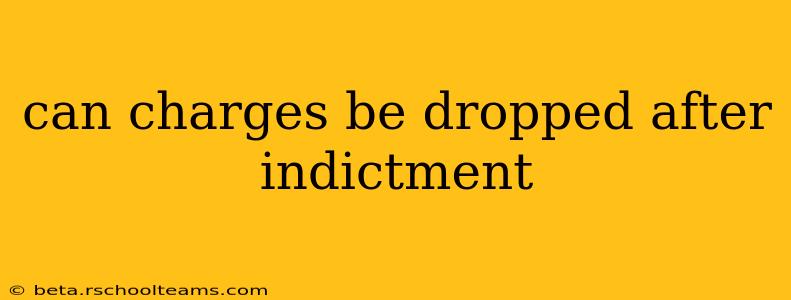The question of whether charges can be dropped after an indictment is complex and depends heavily on the specifics of the case and the jurisdiction. While it's less common than before an indictment, it's certainly possible for charges to be dropped at this stage, or even later in the process. This article explores the various scenarios in which this might occur, providing clarity on a process many find confusing and frightening.
What Happens After an Indictment?
An indictment is a formal accusation by a grand jury that there is enough evidence to proceed with a criminal trial. Once indicted, the defendant is formally charged with the crime(s) and the legal process moves forward. This typically involves arraignment (where the defendant enters a plea), pre-trial motions, and potentially a trial.
Reasons Charges Might Be Dropped After Indictment
Several factors can lead to charges being dropped after an indictment, even though the process is significantly more challenging at this point than before the indictment. These include:
Insufficient Evidence:
- New Evidence: The prosecution might discover new evidence that weakens their case or points to the defendant's innocence. This could be anything from exculpatory evidence (evidence that shows innocence) to information that casts doubt on the credibility of key witnesses.
- Witness Recantation: A key witness might recant their testimony, rendering their previous statements unreliable. This is a significant development that can undermine the prosecution's case.
- Evidence Tampering or Destruction: If evidence is determined to have been tampered with or destroyed, it could severely compromise the prosecution's ability to prove guilt beyond a reasonable doubt, leading to the dismissal of charges.
Procedural Errors:
- Violation of Defendant's Rights: If the prosecution violated the defendant's constitutional rights during the investigation or arrest, the charges might be dismissed. This could include issues related to illegal search and seizure, improper interrogation techniques, or denial of legal counsel.
- Prosecutorial Misconduct: Actions by the prosecutor that are deemed unethical or illegal can lead to the dismissal of charges. This might involve withholding exculpatory evidence, making false statements, or engaging in other forms of misconduct.
Negotiated Plea Bargains:
- Reduced Charges: Even after an indictment, the prosecution might negotiate a plea bargain with the defendant. This could involve reducing the charges to lesser offenses, resulting in a more lenient sentence.
- Dismissal in Exchange for Testimony: The prosecution might drop charges against one defendant in exchange for their cooperation in prosecuting others.
Lack of Resources or Priorities:
- Overburdened System: In some cases, prosecutors might drop charges due to a lack of resources, a heavy caseload, or a prioritization of more serious cases. This is less frequent but can occur.
Can a Prosecutor Just Drop the Charges?
While prosecutors have considerable discretion, they don't have unlimited power to simply dismiss charges after an indictment. They are often required to provide a justification to the court for the dismissal. The judge has ultimate authority and can reject a motion to dismiss if they believe it's not warranted.
What Happens After Charges Are Dropped?
Once charges are dropped, the indictment is dismissed, and the defendant is typically released from any restrictions imposed by the legal proceedings. However, the charges could potentially be refiled if new evidence emerges. A dismissal does not, however, preclude future legal action based on the same facts.
Is it the Same in all Courts?
The specifics of dropping charges after indictment vary between jurisdictions (state vs. federal courts) and even within those systems. Legal counsel is vital to navigate these nuances.
How Can I Find Out if Charges Against Me Have Been Dropped?
You should contact your lawyer immediately to ascertain the status of your case. If you do not have a lawyer, contacting the court clerk directly might provide information on the case's disposition.
This information is for educational purposes only and should not be considered legal advice. Consult with a qualified legal professional for advice tailored to your specific situation. The intricacies of the legal system necessitate seeking personalized guidance from a knowledgeable attorney.
